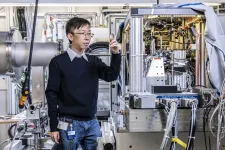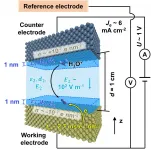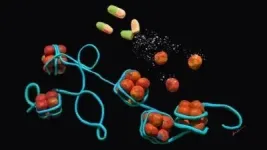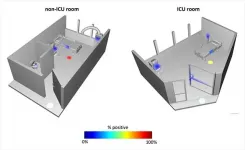INFORMATION:
Elemental copper and iron found within the brains of deceased Alzheimer's patients
Biogenic metallic elements in the human brain?
2021-06-09
(Press-News.org) A new study unexpectedly identified tiny deposits of elemental copper and iron within the brains of two deceased people with Alzheimer's disease. The findings could help scientists better understand how these elemental metals, which were uncovered in the cores of amyloid plaques, contribute to neurodegenerative diseases and could point to a target for alternative Alzheimer's therapies. While enzymes and proteins containing positively charged copper and iron ions have been known to control key processes in the human brain, little has been known about how the organ mineralizes iron and copper, including the formation of elemental metallic nanoparticles, which are more reactive than the oxides from which they arise. To determine the distribution and chemical state of copper and iron within human amyloid plaque samples, James Everett and colleagues examined amyloid plaque cores taken from the gray matter of the frontal and temporal lobes of brains from two deceased Alzheimer's patients using synchrotron-based scanning transmission x-ray microscopy (STXM). Everett et al. identified iron and copper in different chemically reduced states within a single plaque, including various ionized as well as elemental forms, suggesting that repeated reduction and oxidation reactions may occur within these telltale clumps of misfolded proteins. "The unexpected identification of Cu0 and Fe0 within Alzheimer's disease amyloid plaques suggests that biogenic metallic elements, previously observed only in microorganisms, viruses, and plants, can also occur in humans," the authors write. "The reactivity of these metallic phases differs from their metal oxide counterparts previously detected in the human brain and has the scope to redefine our understanding of metal neurochemistry and the role of metal toxicity in neurodegenerative diseases."
ELSE PRESS RELEASES FROM THIS DATE:
Gender differentiates how facial expressions are processed in the brains of alcoholics
2021-06-09
(Boston)--Should treatment of alcoholics be different based on gender? Yes, according to a new study that shows that alcoholic men and women respond differently to their disease resulting in different levels of brain activity and brain abnormalities. Research indicates that they distinguish facial expressions differently and that this is an important clue as to how treatment strategies might be tailored.
Chronic long-term Alcohol Use Disorder (AUD) or "alcoholism," is a harmful condition that has been associated with deficits in emotion and memory, including memory for the emotional expressions of faces. In addition to its effects on memory for facial emotions, AUD also has been associated with impairments ...
How catalysts age
2021-06-09
PSI researchers have developed a new tomography method with which they can measure chemical properties inside catalyst materials in 3-D extremely precisely and faster than before. The application is equally important for science and industry. The researchers published their results today in the journal Science Advances.
The material group of vanadium phosphorus oxides (VPOs) is widely used as a catalyst in the chemical industry. VPOs have been used in the production of maleic anhydride since the 1970s. Maleic anhydride in turn is the starting material for the ...
Researchers develop tool to aid in development, efficiency of hydrogen-powered cars
2021-06-09
Widespread adoption of hydrogen-powered vehicles over traditional electric vehicles requires fuel cells that can convert hydrogen and oxygen safely into water - a serious implementation problem.
Researchers at the University of Colorado Boulder are addressing one aspect of that roadblock by developing new computational tools and models needed to better understand and manage the conversion process. Hendrik Heinz, an associate professor in the Department of Chemical and Biological Engineering, is leading the effort in partnership with the University of California Los Angeles. His team recently published new findings on the subject in Science Advances.
Fuel cell electric vehicles combine ...
Lower and safer doses of laughing gas relieve treatment-resistant depression in phase 2 trial
2021-06-09
A single one-hour treatment with nitrous oxide - also known as laughing gas - can relieve symptoms of treatment-resistant depression for several weeks, according to a phase 2 clinical trial involving 28 participants. By showing that a 25% concentration of the gas still has therapeutic effects, the results suggest that lower concentrations of nitrous oxide could be useful against depression in the clinic while bringing a lower risk of side effects. Inhaled nitrous oxide is commonly used as a sedative agent in dental and medical offices, but the gas has also attracted attention as a possible treatment for depression. A previous study showed that nitrous oxide had marked ...
Curtin study finds aspirin takes the headache out of restoration
2021-06-09
New Curtin research has shown how a readily available, cheap and safe-to-use product found in the medicine cabinet of most homes could be the key to better ecological restoration practices with major benefits for the environment and agriculture.
The study revealed that aspirin, which naturally occurs in the bark of the willow tree and other plants, can improve the survival of grass species important for ecological restoration and sustainable pasture when applied in a seed coating.
Lead researcher Dr Simone Pedrini from the ARC Centre for Mine Site Restoration in Curtin's School of Molecular and Life Sciences, said salicylic acid has been used for its medicinal properties for more than 4000 years and its modern synthetic version, acetylsalicylic acid, or aspirin, is one ...
Rapamycin changes the way our DNA is stored
2021-06-09
Our genetic material is stored in our cells in a specific way to make the meter-long DNA molecule fit into the tiny cell nucleus of each body cell. An international team of researchers at the Max Planck Institute for Biology of Ageing, the CECAD Cluster of Excellence in Ageing research at the University of Cologne, the University College London and the University of Michigan have now been able to show that rapamycin, a well-known anti-ageing candidate, targets gut cells specifically to alter the way of DNA storage inside these cells, and thereby promotes gut health and longevity. This effect has been observed in flies and mice. The researchers believe this finding will open up new possibilities for targeted therapeutic interventions ...
New study underscores the role of race and poverty in COVID-19
2021-06-09
BOSTON - A new analysis by researchers at Massachusetts General Hospital (MGH) offers a novel perspective on the disproportionate impact that COVID-19 has had on people of color, low-income populations, and other structurally disadvantaged groups. Their findings, published in a research letter to the END ...
Study shows new links between high fat diets and colon cancer
2021-06-09
For decades, physicians and dieticians have urged people to limit their intake of high fat foods, citing links to poor health outcomes and some of the leading causes of death in the U.S., such as diabetes, heart disease and cancer.
According to the Centers for Disease Control and Prevention, dietary components high in saturated fats such as red meat are thought to be risk factors for colon cancer. Diet is thought to strongly influence the risk of colorectal cancer, and changes in food habits might reduce up to 70% of this cancer burden.
Other known epidemiological risk factors are family history, inflammatory bowel disease, ...
SARS-CoV-2 detectable -- though likely not transmissible -- on hospital surfaces
2021-06-09
Watching what was happening around the world in early 2020, University of California San Diego School of Medicine researchers knew their region would likely soon be hit with a wave of patients with COVID-19, the infection caused by the coronavirus SARS-CoV-2. They wondered how the virus persists on surfaces, particularly in hospitals, and they knew they had only a small window of time to get started if they wanted to capture a snapshot of the "before" situation -- before patients with the infection were admitted.
After a call late one Sunday night, a team assembled in the ...
Acoustical evolution increases battle between predator, prey
2021-06-09
MELVILLE, N.Y., June 9, 2021 -- In the evolutionary battle between hunter and hunted, sound plays an integral part in the success or failure of the hunt. In the case of bats vs. moths, the insects are using acoustics against their winged foes.
During the 180th Meeting of the Acoustical Society of America, which will be held virtually June 8-10, Thomas Neil, from the University of Bristol, will discuss how moth wings have evolved in composition and structure to help them create anti-bat defenses. The session, "Moth wings are acoustic metamaterials," will take place Wednesday, June 9, at 1 p.m. Eastern U.S.
Nocturnal moths ...
LAST 30 PRESS RELEASES:
Duke-NUS scientists identify more effective way to detect poultry viruses in live markets
Low-intensity treadmill exercise preconditioning mitigates post-stroke injury in mouse models
How moss helped solve a grave-robbing mystery
How much sleep do teens get? Six-seven hours.
Patients regain weight rapidly after stopping weight loss drugs – but still keep off a quarter of weight lost
GLP-1 diabetes drugs linked to reduced risk of addiction and substance-related death
Councils face industry legal threats for campaigns warning against wood burning stoves
GLP-1 medications get at the heart of addiction: study
Global trauma study highlights shared learning as interest in whole blood resurges
Almost a third of Gen Z men agree a wife should obey her husband
Trapping light on thermal photodetectors shatters speed records
New review highlights the future of tubular solid oxide fuel cells for clean energy systems
Pig farm ammonia pollution may indirectly accelerate climate warming, new study finds
Modified biochar helps compost retain nitrogen and build richer soil organic matter
First gene regulation clinical trials for epilepsy show promising results
Life-changing drug identified for children with rare epilepsy
Husker researchers collaborate to explore fear of spiders
Mayo Clinic researchers discover hidden brain map that may improve epilepsy care
NYCST announces Round 2 Awards for space technology projects
How the Dobbs decision and abortion restrictions changed where medical students apply to residency programs
Microwave frying can help lower oil content for healthier French fries
In MS, wearable sensors may help identify people at risk of worsening disability
Study: Football associated with nearly one in five brain injuries in youth sports
Machine-learning immune-system analysis study may hold clues to personalized medicine
A promising potential therapeutic strategy for Rett syndrome
How time changes impact public sentiment in the U.S.
Analysis of charred food in pot reveals that prehistoric Europeans had surprisingly complex cuisines
As a whole, LGB+ workers in the NHS do not experience pay gaps compared to their heterosexual colleagues
How cocaine rewires the brain to drive relapse
Mosquito monitoring through sound - implications for AI species recognition
[Press-News.org] Elemental copper and iron found within the brains of deceased Alzheimer's patientsBiogenic metallic elements in the human brain?




